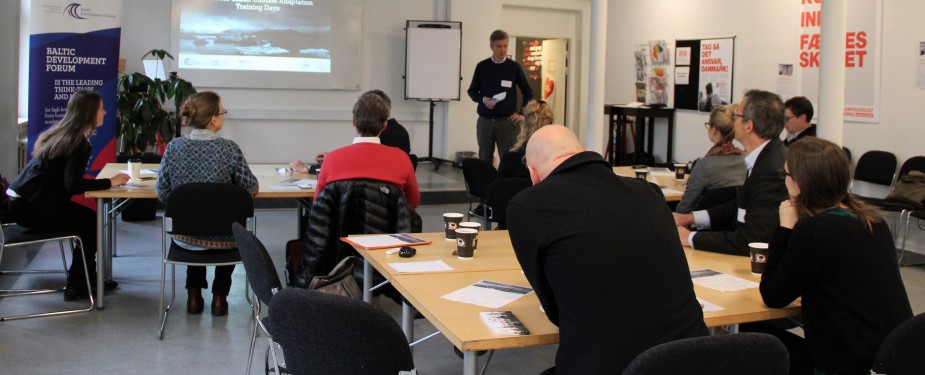“Adaptation is about re-evaluating tradeoff options; this requires more voices, not less”
John Matthews, Coordinator, Alliance for Global Water Adaptation
On the 30th November 2017 Urban climate adaptation was the theme of the day as participants gathered to engage with industry experts, experience best practice cases, and learn about decision making tools. Part of a regional series of training days held in Turku, Stockholm and Copenhagen, organized in collaboration between Stockholm International Water Institute , Union of the Baltic Cities, Alliance for Global Water Adaptation and BDF. The series was supported by Council for the Baltic Sea States Project Support Facility.
Key learning points:
- There is a significant gap between the Western and Eastern Baltic countries in terms of climate change adaptation performance. In the Eastern Baltics, knowledge and tools are perhaps lacking, but with continued focus they are rapidly catching up with the Nordics
- In Denmark, cities have a high recognition of climate adaptation requirements, however practice is uneven amongst municipalities
- There is a need for a regional and unified approach within and between municipalities to achieve the co-benefits of adaptation measures
How the Day Unfolded
Climate Adaptation in the EU – Beyond the low hanging fruit
Kicking off the day Andre Jol of the European Environment Agency showcased the EU’s approach to climate adaptation and the development of national strategies taking place across the EU. It was noted that ‘climate’ related initiatives have had, and are continuing to see large financial support from the EU budget, LIFE programme, Horizon 2020, and European Fund for Strategic Investment. Securing public funds across cities was another story however. The EEA’s latest analyses show that adaptation is in full swing across the region, with an emphasis on green infrastructure and low cost, soft solutions. What is needed now, it was noted, was a transformative, long-term and systematic approach that can be integrative across regions and cities.
Adaptation in Denmark
Moving from European level, Karl Krasling of think tank Concito, presented the climate adaptation situation in Denmark. Based on a survey of Danish Municipalities Karl pointed to the vulnerability of Danish municipalities and cities to water threats such as storm surges and sea level rise. Although regarded as world leading in their adaptation efforts, many Danish municipalities face challenges in ensuring adequate adaptation and mitigation of threats. This comes especially as half of the Danish population live within 5km of the coastline and 1 million within 1km, time is of the essence.
Uneven municipal practices, insufficient risk management and a need for synergies across threats and geographical areas were key challenges. To improve the situation Karl suggested a stronger regional role, clarifying contradictions in legislation, providing stable and predictable financial frameworks, the prioritization of joint municipal actions, better risk mapping, and the engagement of homeowners, amongst other steps.
Towards flexible adaptation pathways
Ad Jueken of Deltares and John Matthews of Alliance for Global Water Adaptation then took the stage to present the ins and outs of CRIDA (Collaborative Risk informed Decision Analysis), World Bank Decision Tree Framework and Eco-engineering Decision Scaling (EEDS). The tools highlighted steps that can be taken to inform decision making towards robust and flexible adaptation solutions and were explained through practical examples from the Netherlands, Philippines and Ecuador.
Water management is a major opportunity in Riga
Next up Nika Kotovica from Riga City Council’s City Development Department took participants through the iWater project, an EUSBSR flagship project made up of 7 cities and 2 partners across the Baltic Sea Region. Its aim, to improve urban planning in storm water management, create new planning tools, develop high quality and resilient urban spaces and decrease the cost of future flooding events. Actions of the project include the Integrated Storm Water Management (ISWM) approach, the iWater toolbox, iWater summer schools and pilot cases. The City of Riga was highlighted as an example from within the project, where the ISWM is helping turn water management issues from a supposed problem, to a great opportunity to develop the city.
Its all about the human focus
Ole Schrøder, Founding Partner of Tredje Natur, one of Denmark’s leading architect practices gave an inspiring call to action to approach climate adaptation from a positive, human enhancing perspective, rather than a fear based, doomsday scenario approach. To enroll everyone in the climate adaptation agenda, good, positive stories and examples must be shown. Its not about protecting ourselves from the future but embracing it to enhance livability and even…create new value. Tredje Natur’s role in Copenhagen’s climate adaptation plan, Klimakvateret, Enghaveparken, St John’s park in New York, and Climate streets projects showcased how adaptation solutions can bring fresh new opportunities to areas with water as a valuable resource.
Securing better decisions for the future
Climate adaptation tools and methodologies are integral to the future decision-making capabilities of cities and regions as we prepare for a diverse range of climate changes and effects. Ad Jueken and John Matthews wrapped up the day with key learnings and a note to tell the good stories around climate adaptation to spur coordinated action amongst stakeholders.
Thank you to all speakers and participants for a successful day
Delteras & AGWA – Risk Informed Planning for Adaptation and Resilience
European Environmental Agency – The EU Adaptation Strategy
iWater Project – Holistic, Sustainable and Cost-effective Storm Water Management
Tredje Natur – Human Solutions to Man Made Problems
Concito – Resilient & Robust Climate Adaptation Strategies in Cities
AGWA – Resilience = Robustness + Flexibility
For more information about the training day please contact Viktoria Nilsson

